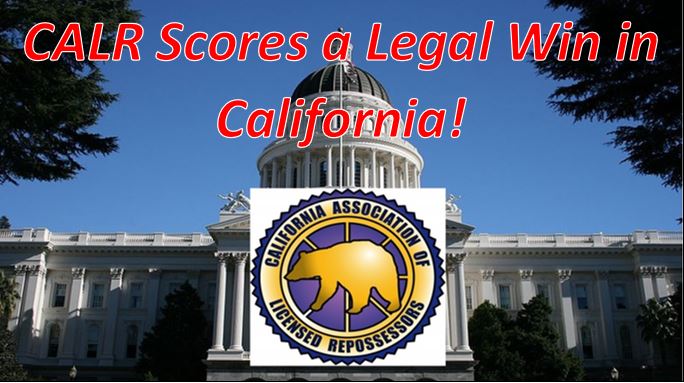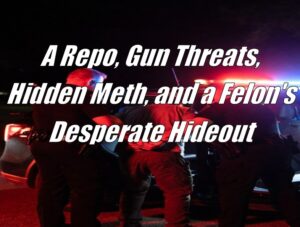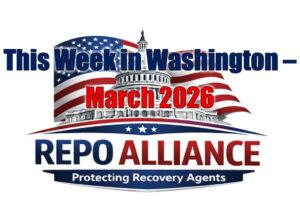
Licensing no longer required of camera car drivers or lot and office staff?
In one of several state bills regulating repossession activities moving through the state of California legislature, the California Association of Licensed Repossessors (CALR) has scored a win! AB 913, a revision to the existing Business and Professions Code, relating to collateral recovery, proposed a large number of common sensical revisions to personal property laws that are both consumer and agency friendly. But in between the lines, CALR believes they scored a big win.
In a rare win for the repossession industry in California, CALR did receive the Governor’s ink on AB913, a CALR supported bill to amend Sections 7500.1, 7504.4, and 7507.9 of the Business and Professions Code, relating to collateral recovery. This win comes directly on the heels of the last-minute veto of a very common sense AB 515 that pertained to agent trespassing during the course of repossessions, which recall survivor, California Governor Gavin Newsom, killed after it’s victorious and laborious crawl through the partisan and repossession industry unfriendly halls of the California legislature.
Licensing Requirements
Earlier versions included language that specifically stated that camera car drivers and office staff were exempt from the states licensing requirements, but these specific exclusions to camera car drivers were disputed with to legislative members by former California agency owner Leon Scroggins.
Scroggins pointed out the reality of conditions in the field in which a camera car driver’s first duty when receiving an LPR his is to verify the VIN which starts the validation of the repossession process. Leon also pointed out that as a practical matter, camera car drivers are typically ordered to maintain surveillance of the vehicle and assist in its recovery upon the arrival of a recovery vehicle.
Leon’s intervention did ruffle some feathers with Marcelle Egley, President of CALR as well as the CALR Legislative Liaison Joe Collins, but Leon is entitled his opinion. This is a free country acter all, at least for a little while longer.
Regardless of these changes, Marcelle and Joe feel that the definitions of the duties performed by a repossessor serves the same purpose. Now codified in AB913 is the definition of when a repossession occurs. This is important for numerous reasons, but primarily in defining the activities performed by a “Repossessor.”
(w) “Repossession” means any of the following:
(1) When the repossessor gains entry to the collateral.
(2) The collateral becomes connected to a tow truck or to a repossessor’s tow vehicle.
(3) The repossessor moves the entire collateral present.
(4) The repossessor gains control of the collateral.
(5) The repossessor disconnects any part of the collateral from any surface where it is mounted or attached.
Based upon these definitions, Marcelle and Joe feel that it is clear that a camera car driver does not in the general scope of their duties perform these duties, nor does a lot attendant or any of the office staff. As such, they feel that they are not Repossessors and should not be subject to licensing requirements. I urge you all to get your own professional legal opinion on this as I am not espousing legal advice as I am not an attorney.
Deadly Weapon Handling
Additionally, the bill codifies the terms of disposal of weapons other than a “Deadly Weapon.”
(b) The following items of personal effects are items determined to present a danger or health hazard when recovered by the licensee and shall be disposed of in the following manner:
(1) (A) Deadly weapons and dangerous drugs shall be turned over to any law enforcement agency for retention. These items shall be entered on the inventory and a notation shall be made as to the date, time, and place the deadly weapon or dangerous drug was turned over to the law enforcement agency, and a receipt from the law enforcement agency shall be maintained in the records of the repossession agency.
(B) Any other instrument or weapon, including, but not limited to, any instrument or weapon of the kind commonly known as a blackjack, slungshot, billy, sandclub, sandbag, metal knuckles, dirk, dagger, any knife having a blade longer than five inches, any razor with an unguarded blade, and any metal pipe or bar used or intended to be used as a club shall be inventoried and noted as “disposed of, dangerous device” and the item shall be disposed of in a reasonable and safe manner.
Third Party Personal Property Handling
Included in this bill are clarifications to personal property handling that cover legal releases to debtor authorized third parties and exclusions from release to lenders or rental car companies, which has been an odd demand that’s reared it’s head.
(i) If personal effects or other personal property not covered by a security agreement are to be released to someone other than the debtor, the repossession agency must receive written authorization to do so from the debtor.
(j) A licensee shall not sell personal effects or other personal property not covered by a security agreement and remit money from the sale to a third party, including, but not limited to, any lending institution.
(k) The inventory shall be a confidential document. A licensee shall only disclose the contents of the inventory under the following circumstances:
(1) In response to the order of a court having jurisdiction to issue the order.
(2) In compliance with a lawful subpoena issued by a court of competent jurisdiction.
(3) When the debtor has consented in writing to the release and the written consent is signed and dated by the debtor subsequent to the repossession and states the entity or entities to whom the contents of the inventory may be disclosed.
(h) With the consent of the licensee, the debtor waives the preparation and presentation of an inventory if the debtor redeems the personal effects or other personal property not covered by a security interest within the time period for the notices required by this section and signs a statement that the debtor has received all the property.
(i) If personal effects or other personal property not covered by a security agreement are to be released to someone other than the debtor, the repossession agency must receive written authorization to do so from the debtor.
While CALR did not get everything they wanted, they did manage to affect legal change to the repossession process in one of the most politically unfavorable legislative bodies to the repossession industry in the nation. This win spells out the value of state level associations and their power to utilize “standing” in a manner that the national associations cannot.
Congratulations to Marcelle and Joe for your success against unfavorable headwinds! All agency owners in the state of California owe you both their gratitude, especially those who are not currently members of CALR!
Once again, this article is intended for informational purposes only and is not intended to serve as legal advice. I am not an attorney, nor have I ever been one and am in no such position to dispense legal opinion. It is strongly advised to obtain professional and competent legal counsel before making legal decisions.









